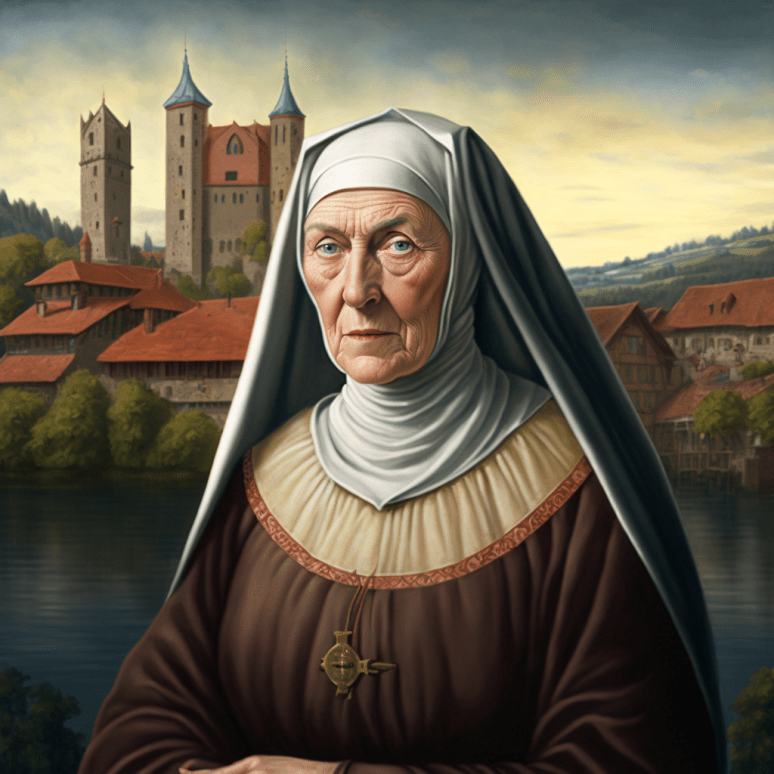
September 17
St. Hildegard of Bingen
Life. (1098-1179)
Religious founder, abbess, mystic, poet, musician, scientist. St. Hildegard of Bingen was all these, which surely makes her one of the most remarkable women of all time and all religions. When Hildegard was eight, her noble parents entrusted this rather frail child to be raised and educated by Blessed Jutta, a hermitess who lived nearby. Jutta taught her not only domestic skills but monastic spirituality, Latin, and hymnody. Jutta meanwhile founded a community of nuns, and Hildegard asked to join it. She was clothed with the habit at the age of fifteen. When Jutta died in 1136, her pupil took over as prioress.
From early years, Hildegard had been favored with visions and divine private revelations. Prophetic remarks would spill out in her ordinary conversation. When she learned that other people did not enjoy the same gift, she became embarrassed. Finally she was impelled to recount these experiences to her spiritual director, who related them to the Archbishop of Mainz. The archbishop was convinced they were genuine, so he told her henceforth to dictate what her heavenly voices said. Of the books of revelations that she now authored, most of them in apocalyptic terms, the most important was the book called Scivias. It took ten years to complete, and deals with God, creation and redemption, in 26 visions. Pope Blessed Eugenius III got interested, had her writings - and herself - examined, and then gave her his positive encouragement to continue. The Spirit was speaking through her, he said.
Hildegard was by no means occupied only in receiving and recording visions. She built a new monastery near Bingen, to accommodate 50 nuns. It was well constructed, and had “water piped to all the offices.” Later she established a daughter monastery at Eibingen. As she grew in fame, Abbess Hildegard extended her contacts personally and by correspondence. Those who consulted her were St. Bernard of Clairvaux, St. Elizabeth of Schoenau, Emperor Frederick Barbarossa, King Conrad III, ten archbishops, and many bishops, clergy and laity. As often as not, when she wrote to the high-placed, it was to pass on to them reproofs and prophecies she had received in her heavenly messages. She spoke frankly, for she was no respecter of persons.
Not all of her writings were devoted to revelations as such, but all of them were meant to edify. She composed the words and music of 70 hymns; wrote 50 homilies; authored a morality play or cantata; and in her leisure time even devised an international language similar to Esperanto. She also showed herself a keen observer of nature, and wrote two books on medicine and natural history. Plants, animals, and the human body and its ailments were her subject matter. In her comments on physiology she showed deep awareness, and she came close to discovering the circulation of the blood. She showed good psychological discernment, too. For instance, Hildegard cautioned against diagnosing as diabolical-possession types of behavior more likely attributable to physical and nervous disorders. Abbess Hildegard was not without her trials. Her physical weakness increased with age and she often had to be carried places. The vicar general also interdicted her church not long before her death. An excommunicated man had been buried in its cemetery, and the vicar general ordered the body removed. Hildegard declined to do so because it had been revealed to her that the excommunicate had indeed received the last sacraments. Fortunately, when her bishop returned to the diocese, he lifted the interdict.
With her mystical writings, this “Sybil of the Rhine” inaugurated the tradition of mystical writing for which the Rhineland became famous. Today scholars are even more interested in her work as a scientific pioneer. All in all, the “incomparable Hildegard” was one of the most remarkable of female saints in gifts and influence. She ranks with Catherine of Siena, Teresa of Avila and Bridget of Sweden as a woman who, in her own generation, acquired international importance.
On May 10, 2012, Pope Benedict XVI extended the liturgical cult of St. Hildegard to the universal Church, in a process known as “equivalent canonization”. On October 7, 2012, he declared St. Hildegard to be the 35th Doctor of the Church. --Father Robert F. McNamara
Scripture (Song of Songs 8:6-7)
he would be roundly mocked.
Writings
Musical Selection
O vis aeternitatis
que omnia ordinasti in corde tuo,
per Verbum tuum omnia creata sunt
sicut voluisti,
et ipsum Verbum tuum
induit carnem
in formatione illa
que educta est de Adam.
Et sic indumenta ipsius
a maximo dolore
abstersa sunt.
O quam magna est benignitas Salvatoris
qui omnia liberavit
per incarnationem suam,
quam divinitas exspiravit
sine vinculo peccati.
Et sic indumenta ipsius …
Gloria Patri et Filio
et Spiritui Sancto.
Et sic indumenta ipsius …
O power of eternity,
who have ordered all things in your heart:
by your word all things are created
as you have willed,
and your word itself
puts on flesh
in the form
that is drawn from Adam.
And so those garments
are wiped clean
by great pain.
O how great is the savior’s kindness,
who freed all things,
by that incarnation
which divinity breathed out,
unchained by sin.
And so those garments …
Glory be to the Father and to the Son
and to the Holy Spirit.
And so those garments …
Collect
Most glorious and holy God,
Whose servant Hildegard, strong in the faith,
was caught up in the vision of your heavenly courts:
by the breath of your Spirit
open our eyes to glimpse your glory
and our lips to sing your praises with all the angels;
through Jesus Christ your Son our Lord,
who lives and reigns with you,
in the unity of the Holy Spirit,
God, now and for ever. Amen. (English Missal)